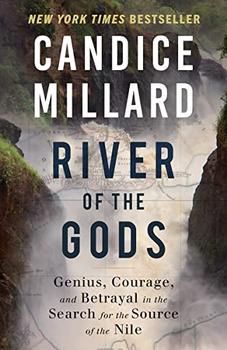Summary | Excerpt | Reviews | Beyond the Book | Readalikes | Genres & Themes | Author Bio

Genius, Courage, and Betrayal in the Search for the Source of the Nile
by Candice Millard
The only childhood teacher Burton respected was his fencing master, a former soldier who had only one thumb, having lost the other in battle. Richard and his brother threw themselves into fencing with such wild enthusiasm that their studies nearly ended in tragedy. "We soon learned not to neglect the mask," Richard wrote. "I passed my foil down Edward's throat, and nearly destroyed his uvula, which caused me a good deal of sorrow." The lessons, however, not only paid off but eventually produced one of the most skilled swordsmen in Europe. Burton earned the coveted French title Maître d'Armes; perfected two sword strokes, the une-deux and the manchette—an upward slashing movement that disabled an opponent, often sparing his life; and wrote both The Book of the Sword and A Complete System of Bayonet Exercise, which the British Army published the same year he left for Mecca. Fencing, he would later say, "was the great solace of my life."
As Burton grew into a young man, he also developed another all-consuming, lifelong interest, one that would make him even less welcome in polite society: sex. What began as love affairs with beautiful women from Italy to India quickly transformed into something more enquiring and erotic, and far less acceptable in Victorian England. As a young officer in Sindh, now a province in southeastern Pakistan, he famously investigated the homosexual brothels, writing a report for his commander that he claimed later hindered his career. His ethnological writings, which in the end would range from Asia to Africa to North America, focused not only on the dress, religion, and familial structures of his subjects, but on their sexual practices. His readers would be shocked by open and detailed discussions of polygamy and polyandry, pederasty and prostitution. Burton, however, had little time for British priggishness and no interest in what he referred to as "innocence of the word not of the thought; morality of the tongue and not of the heart."
Although Burton's nomadic childhood and scandalous interests left him feeling cut off from his country and distrusted by his countrymen, he did learn one striking thing about himself along the way: He was, in the words of one of his flabbergasted tutors, "a man who could learn a language running." In the end, he would speak more than twenty-five different languages, along with at least another dozen dialects. To some extent, his gift for languages was a product of natural ability and early training. "I was intended for that wretched being, the infant phenomenon," he explained, "and so began Latin at three and Greek at four." It was his fascination with other cultures, however, and his methodical mind that made him one of the world's most gifted linguists. He had worked out a system early on that allowed him to learn most languages in two months, and he never seemed to understand why others found it so hard. "I never worked more than a quarter of an hour at a time, for after that the brain lost its freshness," he wrote. "After learning some three hundred words, easily done in a week, I stumbled through some easy book-work (one of the Gospels is the most come-atable), and underlined every word that I wished to recollect, in order to read over my pencillings at least once a day. . . . The neck of the language was now broken and progress was rapid."
After engineering his own expulsion from Oxford, where he had been ridiculed, ignored, and bored, Burton had joined the 18th Regiment of Bombay Native Infantry, a regiment within the East India Company. Realizing that one of the fastest ways to rise through the ranks was to become an interpreter, he learned twelve languages in seven years. He had begun studying Hindustani immediately upon arriving in India and six months later easily passed first among the many gifted linguists taking the exam. Over the following years, one after another, he steadily added languages to his long list: Gujarati, Marathi, Armenian, Persian, Sindhi, Punjabi, Pashto, Sanskrit, Arabic, Telugu, and Turkish, rarely placing second to even his most talented rivals.
Excerpted from River of the Gods by Candice Millard. Copyright © 2022 by Candice Millard. All rights reserved. No part of this excerpt may be reproduced or reprinted without permission in writing from the publisher.
Your guide toexceptional books
BookBrowse seeks out and recommends the best in contemporary fiction and nonfiction—books that not only engage and entertain but also deepen our understanding of ourselves and the world around us.